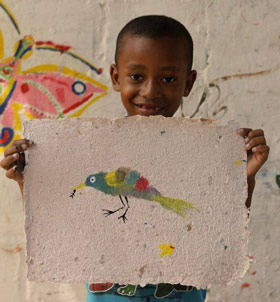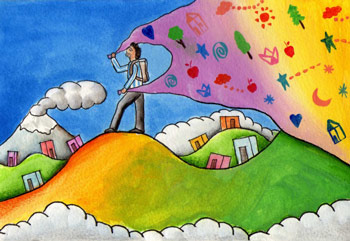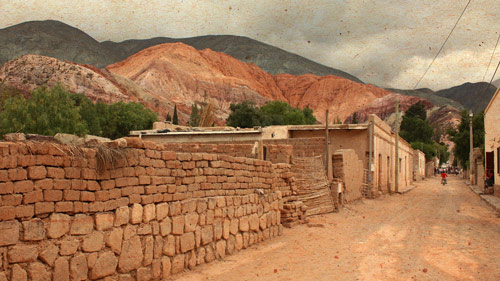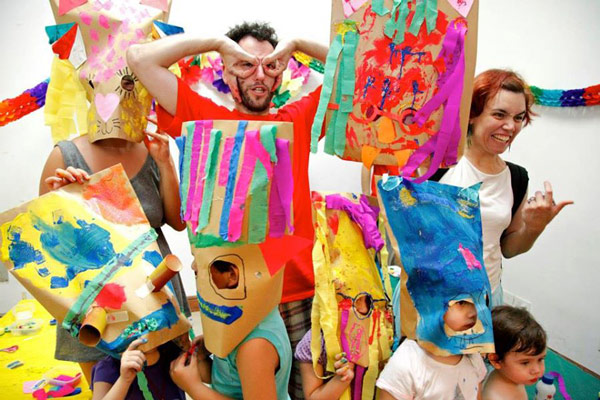translated by: Eric Barenboim
(any improvement or advice on the translation will be appreciated)*
Dear teachers from a rural school in the outskirts of a hill 
or in the most exclusive private school in the heart of a huge city,
Great povery, or great wealth, the one that covers us all, is where we stand
in relation to the world, inside or outside. Performers or witnesses. Hosts or immigrants, guests.
Where we place ourselves and where we place others.
The main mistake in culture and education happens if they make you believe they speak to you from a center,
and that their authority has a core
where everything stocks and generates
(we can put it in these severe terms: that’s “the main crime”).
For then you convince yourself, directly or indirectly,
that you are in the outside,
without the ticket to “belong”, or without deserving it at all.
Culture and education will be something external
dripping onto you as something benevolent in the best of cases
but foreign.
Your knowledge is not a part of it
it doesn’t add a brick,
it’s useless,
your answers don’t work,
not even for your every-day life, or those of the ones you care for.
With that conviction one perceives oneself as alien to one’s own fate,
and we see ourselves as the wrong tool to our own happiness.
“Happy the others” who were born where one should be born,
who paint the paintings one should paint,
who read the books one should read,
and take the decisions one should take.
The opposite answer also fails:
when we take the world as our enemy.
Today, more than ever, we confirm that culture and education are center-less (thus there are no outsides).
In this set of nets anyone can create content visible to everyone, immediately, and access to contents from all around the world “on demand”.

It’s better to think of a double path:
We enhance the world, and the world enhances us:
1) I know of something which interests the rest.
2) My origin (family, place) has something of interest to others.
3) In the world there are others with stories or chosen paths that can enhance me.
Simple exercises detach from here:
exercise 1
Every day, early at the start, or some other time, answer:
1) What picture or story would you share from something that happened yesterday? Which video would you show? (Imaginarily)
2) “Browse” through the world’s menu and check if something turns out to be attractive:
* a place I’d like to visit, or where I’d like to be
* some food I’d like to try
* some music or instrument I’d like to play
* a craft
* an adventure
* a person I’d like to meet

exercise 2
Sit together with one or two good friends, and help one another:
This is because we don’t always come to be our best “readers” or “explorers” – even great artists didn’t get to see the value of their own work until it was found by the right reader.
We can assume that a good friend (someone who cares for us) will be a good reader, and that they will help us find something attractive to show to the world. The same works from us towards them.
exercise 3
But it could happen that a teacher is dealing with a community which thinks they’re the best of all, who are shut away from the world, or that they act like that just out of fear or because of an exaggerated sense of superiority.
It could also be the opposite: that we work with a group who, from the start, is convinced that “the best of all is someplace else”, the best music, the best entertainment, the jobs with the best income, the tastiest food, the prettiest houses and cars, etc. Their place and themselves, are the poorest of all.
The funny thing is that both situations can be found either in rural communities or huge city centers. In either of both extremes (modern crowded areas or little isolated small towns) we can find communities who feel they are “the dreamed ones”, or who spend their whole life sighing, dreaming they were someone else.

So it’s the teachers task:
1) To convince one group that a particular custom or a particular song, their food or a toy, or that which they know how to do, would amaze many in different parts of the world. That it would attract interest or be taken as beautiful. The teacher will be then an interpreter between his group and the world.
2) To show the other group that there are things in the world they would love to have, or cause them admiration. Or, at least, that in their own little town there were more of the world’s features than they had imagined: where did this tennis come from? Where was this radio built? Where do those to whom we sell our products live? What would happen to us if we suppressed all contact with the world and took away any trace of the world in us?
In any of both extremes the teacher will be a good guide, interpreter, or generous mediator.

exercise 4
It’s not good to make this exercise “once and for all”, better to write down in pencil, a little bit every day, making corrections:
Two lists:
1) In what activity, place, craft, do you feel leader, in control, safe, outstanding, at ease? With whom do you feel secure, like you lead the dance?
2) The same thing (person, place, craft, etc.), but with those in which you feel new, just arrived, invited, never leader, always an apprentice.
Luis Pescetti
P.S.: all images belong to a project started by Ivanke, an Argentinean illustrator, whom we strongly recommend you to check out: Pequeños Grandes Mundos (Small Big Worlds), click here

*Thanks Mariana Ruiz for improving the translation!
© Luis Pescetti
